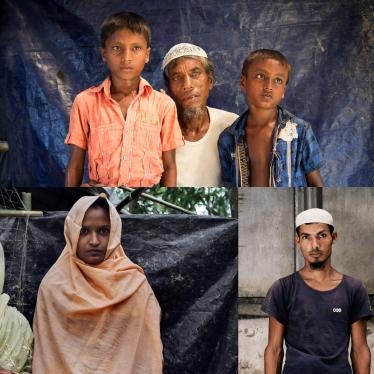(New York) The Cambodian government needs to demonstrate that it wants to hold fair and credible trials of former Khmer Rouge leaders, Human Rights Watch said today. On Wednesday, the United Nations General Assembly passed a resolution requesting the Secretary-General to resume negotiations with Cambodia to form a tribunal.
"To date Cambodia's leaders have balked at every attempt to secure minimum guarantees of independence and integrity for the tribunal," said Mike Jendrzejczyk, Washington director of the Asia Division of Human Rights Watch. "With the passage of this resolution, there's a serious risk that the United Nations will be pressured for reasons of political expediency to agree to any tribunal, regardless of how it's constructed. There seems to be one standard of justice for Cambodia and another for the rest of the world."
Human Rights Watch expressed concerns that the General Assembly resolution calls for negotiations to resume based on a law passed by the Cambodian National Assembly in 2001, which has serious shortcomings from a human rights perspective. The law establishes a special "mixed tribunal" presided over by a majority of Cambodian judges and co-prosecutors, along with judges and prosecutors from other countries. But the tribunal will not come into being without the agreement of the United Nations.
Thus far, the United Nations has taken a principled stand, insisting that the law and any agreement between Cambodia and the United Nations contain provisions that guarantee minimum international standards of justice, including independent judges and prosecutors, access to appropriate defense counsel, and provisions for witness protection. But countries such as France and Japan, which co-sponsored the U.N. resolution, together with the United States and Australia, have put strong pressure on the United Nations to compromise international standards to reach an agreement with Cambodia.
"The United Nations must not be forced into a bad agreement that only creates the appearance of justice," said Jendrzejczyk. "Cambodians have waited too long to watch a sham."
The Khmer Rouge ruled Cambodia from 1975-79. During its reign, approximately two million Cambodians died from executions, diseases and starvation.
"Many consider this period to be the darkest in human history, yet no Khmer Rouge leader has ever stood trial," said Jendrzejczyk.
Cambodian human rights groups and the Cambodian Bar Association have consistently called for trials that meet international standards. On December 9, the Cambodian Human Rights Action Committee called on the Cambodian government to "fulfill its obligations to find justice for the dead by accepting international standards of justice."
While Cambodians have made clear their desire for justice, many former Khmer Rouge leaders live freely among their victims, and even travel abroad. Only two are in custody. Pol Pot's former deputy, Nuon Chea, lives in Pailin, along the Thai border, and recently traveled to Thailand. The former President of the Khmer Rouge, Khieu Samphan, has also "retired" in Pailin. Both left the Khmer Rouge in late 1998 as the movement was collapsing and were treated as returning heroes by Prime Minister Hun Sen, who announced that it was time to "bury the past." Former Khmer Rouge Foreign Minister Ieng Sary lives in a villa in Phnom Penh. Hun Sen has publicly stated that Ieng Sary will never be put on trial.
The United Nations and Cambodian government have been involved in negotiations over the creation of a tribunal for the Khmer Rouge since 1997, when the Cambodian government asked the United Nations to help establish a tribunal like those in the Former Yugoslavia and Rwanda. In 1999, a U.N. group of experts wrote a detailed and widely praised report calling for an international tribunal, citing the lack of independence and public confidence in the Cambodian judiciary. This was rejected by Prime Minister Hun Sen. Under pressure from the United States, France and others, the United Nations agreed in 2000 to participate in the first "mixed tribunal," in which there would be a majority of Cambodian judges and co-prosecutors. Negotiations have stalled since.






